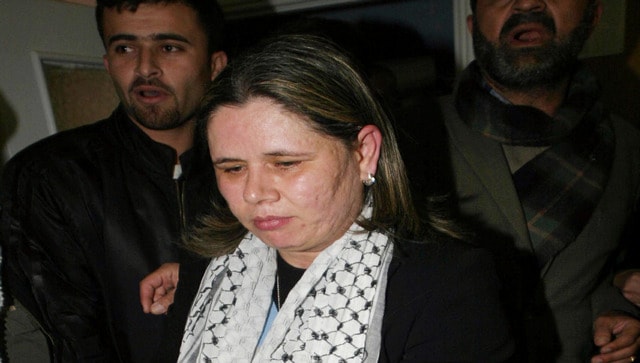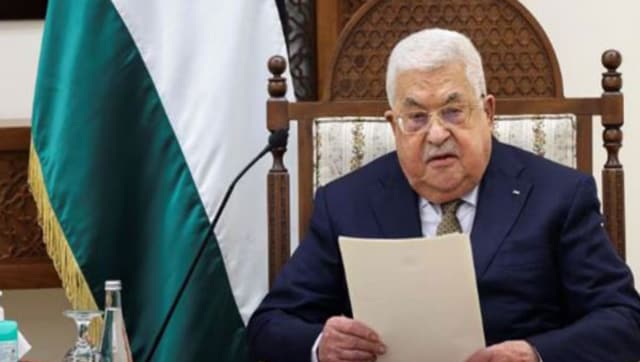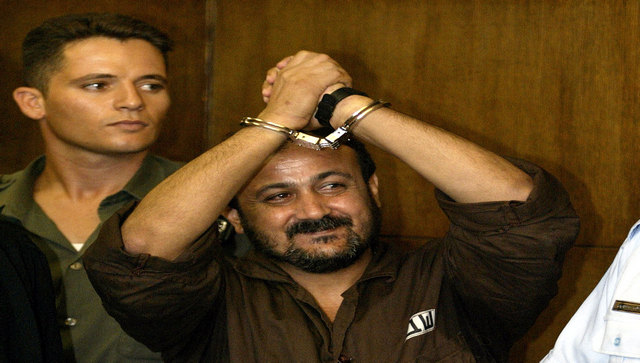As the Israel-Hamas war rages on in Gaza, many remain concerned about the future of the Palestinian people. With that in mind, some are turning their eyes towards Marwan Barghouti – also known as the ‘Palestinian Mandela’. But who is Barghouti? And why are some convinced he could bring peace to Gaza? Let’s take a closer look: Who is he? According to The National, Barghouti is Palestine’s most senior leader in prison. He was born on 6 June, 1959, in Ramallah’s Kibar village into the Barghouti clan. Incidentally, that was the very year that Fatah – the organisation that seeks the liberation of Palestinians – came into existence. Barghouti joined Fatah in 1974. As per Haaretz, he was arrested for the first time at age 15 for protesting the Israeli occupation.
He was sent to jail for the first time in 1978 for being a member of Fatah.
In prison, Barghouti began improving himself. Not only did he learn English and Hebrew, but he also completed his education. In 1983, Barghouti enrolled in Birzeit University and studied history and political science. It was here he met his future wife Fadwa Ibrahim – a lawyer whom he wed in 1984. Their nuptials had to be repeatedly postponed due to his repeated interrogations and arrests, as per Haaretz. “In those years he lived between interrogation and arrest, an underground life,” Fadwa said. “The university was the core of national Palestinian agitation.” In 1987, Barghouti established himself within Fatah and among the people by becoming a spearhead of the 1987 uprising – called the First Intifada. As per Haaretz, an ex-senior Shin Bet official claimed Barghouti was involved in a murder of a settler during that uprising. However, the authorities decide to expel Barghouti and some Birzeit University leaders were to Jordan by the authorities in a ‘pre-emptive strike.’ Barghouti’s wife Fadwa would join him in Jordan – and they would shift between that country and Tunisia. [caption id=“attachment_13615562” align=“alignnone” width=“640”] Fadwa Barghouti, the wife of jailed Palestinian leader Marwan Barghouti, has launched a fresh campaign calling for his release. Reuters.[/caption] “He wasn’t by my side in any of the births of my four children,” Fadwa was quoted as saying by Haaretz. Israel allowed Barghouti to return following the 1994 Oslo Accords. Barghouti was in 1996 elected to the new Palestinian Legislative Council, as per The National. Barghouti, who was secretary general of Fatah, also headed up the Tanzim, Fatah’s armed wing. He played a big role in the Second Intifada which kicked off in September 2000. He even wrote an op-ed for the Washington Post in January 2002 in which he lay claim to being one of the main leaders of the Palestinian movement. Arrest and detention Then, the order was given for his arrest – reportedly directly from then prime minister Ariel Sharon. “I don’t want him liquidated – just arrest him,” then defence minister Benjamin Ben-Eliezer told the then Israel Defense Forces chief of staff Shaul Mofaz. Yitzhak Gershon, the division commander who captured Barghouti, told Haaretz how it went down. “I put him in the command car,” Gershon said. “I took out my canteen and gave him water. He was kind of flipped out. Very frightened. I said to him: Don’t worry. We will not do to you what you would have done to us.”
Fadwa Barghouti, the wife of jailed Palestinian leader Marwan Barghouti, has launched a fresh campaign calling for his release. Reuters.[/caption] “He wasn’t by my side in any of the births of my four children,” Fadwa was quoted as saying by Haaretz. Israel allowed Barghouti to return following the 1994 Oslo Accords. Barghouti was in 1996 elected to the new Palestinian Legislative Council, as per The National. Barghouti, who was secretary general of Fatah, also headed up the Tanzim, Fatah’s armed wing. He played a big role in the Second Intifada which kicked off in September 2000. He even wrote an op-ed for the Washington Post in January 2002 in which he lay claim to being one of the main leaders of the Palestinian movement. Arrest and detention Then, the order was given for his arrest – reportedly directly from then prime minister Ariel Sharon. “I don’t want him liquidated – just arrest him,” then defence minister Benjamin Ben-Eliezer told the then Israel Defense Forces chief of staff Shaul Mofaz. Yitzhak Gershon, the division commander who captured Barghouti, told Haaretz how it went down. “I put him in the command car,” Gershon said. “I took out my canteen and gave him water. He was kind of flipped out. Very frightened. I said to him: Don’t worry. We will not do to you what you would have done to us.”
Barghouti has been in jail since 2002.
In May 2004, Barghouti was convicted of five murders. He is currently serving five life sentences. Behind the bars of his prison cell, Barghouti has refused to be silenced. He played a key role in signing the Prisoner’s Document in 2006, written by Palestinian prisoners affiliated with Fatah, Hamas, Islamic Jihad, the Popular Front for the Liberation of Palestine (PFLP) and the Democratic Front for the Liberation of Palestine (DFLP). The text called for the creation of a Palestinian state on the 1967 borders, for Palestinian resistance to be limited to territories occupied in 1967, for a mutual ceasefire to be respected and for Palestinians to uphold their right to resist occupation in accordance with international law. Its goal was to form a coalition government in order to break the political deadlock brought on by Hamas’s 2006 electoral victory in the Gaza Strip. Considered a “terrorist organisation” by the EU, US and Israel, the Islamist group’s victory was never recognised and led to violent clashes between Fatah and Hamas supporters. Over the years, Barghouti has positioned himself as the only person capable of uniting rival Palestinian political groups. “He is close to Hamas and accompanied the group on several occasions, notably with the Prisoner’s Document. He managed to get Hamas and Fatah to agree. He’s someone who has the ability to bring people together, and that’s why he had a good chance of winning the legislative elections in 2021,” said Chagnollaud. But the 2021 Palestinian elections never took place. Since the death of Yasser Arafat in 2004, Mahmoud Abbas has been the sole president of the Palestinian Authority. Although his mandate officially expired in 2009, Abbas indefinitely postponed the elections, citing Israel’s refusal to allow the inclusion of East Jerusalem in the polls. Many experts, however, believe the real reason behind the 88-year-old president’s decision was to avoid a crushing defeat. “The fairly reliable Israeli and Palestinian polls gave Barghouti a serious chance of winning over Abbas. He still has prestige among the Palestinian population,” said Chagnollaud. French geopolitical scholar and Middle East expert Frédéric Encel agrees. “He spent many years in prison in Israel, which obviously gives him a reputation of probity, heroism and patriotism in the eyes of Palestinians,” Encel explained. “When he was head of Fatah he was in favour of an alliance with Hamas, which is not the case for all members of the Palestinian Authority.” In recent years, Barghouti has emerged in Palestinian polls as the most popular figure among young people, far ahead of Abbas and Hamas leader Ismail Haniyeh. [caption id=“attachment_13217052” align=“alignnone” width=“640”] Palestinian president Mahmoud Abbas has been the sole president of the Palestinian Authority since 2004. Reuters[/caption] In August 2023, his wife Fadwa Barghouti launched yet another international campaign calling for his release, called “Freedom for Marwan Barghouti, the Mandela of Palestine”. “There have been campaigns to free Barghouti for years, namely to nominate him for a Nobel Peace prize. Like Mandela, he has spent more than 20 years in prison, so this reinforces his symbolic value as a political negotiator,” said Chagnollaud. “It’s quite logical because basically, it reinforces the notion that he has the capacity to be a unifying leader and get out of an impossible situation.” A prison stay has long been a source of legitimacy for the Palestinian people, he noted. “Those who come out of prison are adorned with a halo, it’s a kind of resistance rite of passage,” said Chagnollaud. On the political stage, few people can fill Barghouti’s shoes. “Potential leaders have no charisma and what’s more, are hated by the population precisely because they’re part of the Palestinian security apparatus that collaborates with Israeli security,” said Chagnollaud.
Palestinian president Mahmoud Abbas has been the sole president of the Palestinian Authority since 2004. Reuters[/caption] In August 2023, his wife Fadwa Barghouti launched yet another international campaign calling for his release, called “Freedom for Marwan Barghouti, the Mandela of Palestine”. “There have been campaigns to free Barghouti for years, namely to nominate him for a Nobel Peace prize. Like Mandela, he has spent more than 20 years in prison, so this reinforces his symbolic value as a political negotiator,” said Chagnollaud. “It’s quite logical because basically, it reinforces the notion that he has the capacity to be a unifying leader and get out of an impossible situation.” A prison stay has long been a source of legitimacy for the Palestinian people, he noted. “Those who come out of prison are adorned with a halo, it’s a kind of resistance rite of passage,” said Chagnollaud. On the political stage, few people can fill Barghouti’s shoes. “Potential leaders have no charisma and what’s more, are hated by the population precisely because they’re part of the Palestinian security apparatus that collaborates with Israeli security,” said Chagnollaud.
Even those that have served Israel faithfully have called for his release.
“In my opinion, he should be released unconditionally at this point. And not as a collaborator with us, but as someone who will see to the [future of he] Palestinian people, if there is even a small chance that he may become a leading figure on the other side. I say this even though I know he has blood on his hands, as the leader of the Tanzim in the second intifada. Peace is made with powerful enemies whose honour has not been trampled,” Gershon told Haaretz. Speaking to The Guardian, retired Israeli admiral Ami Ayalon pushed for releasing Barghouti as a step towards establishing peace. He also points to Barghouti’s enduring popularity with the people. “Look into the Palestinian polls. He is the only leader who can lead Palestinians to a state alongside Israel. First of all because he believes in the concept of two states, and secondly because he won his legitimacy by sitting in our jails,” Ayalon added. “Every time there’s an internal crisis or a flare-up with Israel, his name comes up,” said Jean-Paul Chagnollaud, head of the Institut de Recherche et d’études Méditerranée Moyen-Orient (iReMMO), a Paris-based think tank. “He was arrested over 20 years ago, during the [2000-2005] Second Intifada. He was a very active Fatah leader and was not assassinated,” explained Chagnollaud. “That’s an important detail because at the time, there were many targeted assassinations and he wasn’t one of them. He was arrested and I don’t think that was by accident.” So, is Barghouti another Mandela? Some argue he can be. [caption id=“attachment_12983792” align=“alignnone” width=“640”] Experts pointed out that Nelson Mandela and the ANC were once viewed as terrorists and saboteurs. Reuters[/caption] A piece in Al Jazeera noted that while the common man may be against someone like Barghouti, Israel’s leaders are not. “With so much Palestinian blood on their hands, they are the last to judge this freedom fighter for his record of resistance against the occupation,” the piece argued. It noted that Mandela and the African National Congress (ANC) were for years known as ‘terrorists and saboteurs’ and that the great man himself remained on the US terror watchlist till 2008. “But when South Africa came under international pressure and its leader, President FW de Klerk, showed the necessary wisdom to release the ANC leader, Mandela became an acceptable and credible interlocutor overnight,” the piece noted. “Barghouti, who is fluent in Hebrew and even supported the Oslo Accords until he became disillusioned, just like Mandela, also believes in peaceful coexistence based on freedom, justice and equality. The Palestinian people are ready to present the world with their own Mandela. But is the world ready to pressure Israel, as it pressured apartheid South Africa, to produce its own de Klerk?” the piece concluded. But not everyone is convinced. ‘Bought his leadership with blood of Jews’ Avi Dichter, chief of Shin Bet at the time the hunt for Barghouti was on, told Haaretz, “There were ministers in the Sharon government who tried to pressure me to take a stand in favor of his release. I told them not to bother. A very senior Israeli political figure described him to me as ‘Mandela.’ [Former Meretz leader] Haim Oron saw him as the future of the Palestinian nation. I told them all that he had bought his leadership with the blood of Jews.”
Experts pointed out that Nelson Mandela and the ANC were once viewed as terrorists and saboteurs. Reuters[/caption] A piece in Al Jazeera noted that while the common man may be against someone like Barghouti, Israel’s leaders are not. “With so much Palestinian blood on their hands, they are the last to judge this freedom fighter for his record of resistance against the occupation,” the piece argued. It noted that Mandela and the African National Congress (ANC) were for years known as ‘terrorists and saboteurs’ and that the great man himself remained on the US terror watchlist till 2008. “But when South Africa came under international pressure and its leader, President FW de Klerk, showed the necessary wisdom to release the ANC leader, Mandela became an acceptable and credible interlocutor overnight,” the piece noted. “Barghouti, who is fluent in Hebrew and even supported the Oslo Accords until he became disillusioned, just like Mandela, also believes in peaceful coexistence based on freedom, justice and equality. The Palestinian people are ready to present the world with their own Mandela. But is the world ready to pressure Israel, as it pressured apartheid South Africa, to produce its own de Klerk?” the piece concluded. But not everyone is convinced. ‘Bought his leadership with blood of Jews’ Avi Dichter, chief of Shin Bet at the time the hunt for Barghouti was on, told Haaretz, “There were ministers in the Sharon government who tried to pressure me to take a stand in favor of his release. I told them not to bother. A very senior Israeli political figure described him to me as ‘Mandela.’ [Former Meretz leader] Haim Oron saw him as the future of the Palestinian nation. I told them all that he had bought his leadership with the blood of Jews.”
The chances of Barghouti becoming a leader after the war ends are low, Chagnollaud agreed.
Israel has not responded to the Hamas call for a prisoner exchange and had demanded an unconditional release of the hostages held by Hamas. “An exchange of that sort is very rare, and anything can change from one moment to the next. If he were to be released, yes, he could play a role. But in the current chaos, I don’t see how that’s possible. Unless he is co-opted by Fatah, who don’t want him,” he noted. For Encel, there is no guarantee that Barghouti will agree to “take on major responsibilities at the head of the Palestinian Authority and more specifically in Gaza”. As the war between Hamas and Israel intensifies, the future of the Gaza Strip seems increasingly unclear. “I don’t believe that Israel will manage to eradicate Hamas, even its military wing,” said Chagnollaud. “And even if the Israelis managed, another military branch would pop up sooner or later.” “Gaza, on the other hand, is going to be destroyed. It’s a total disaster and no one knows what the repercussions will be,” he concluded. With inputs from agencies
)